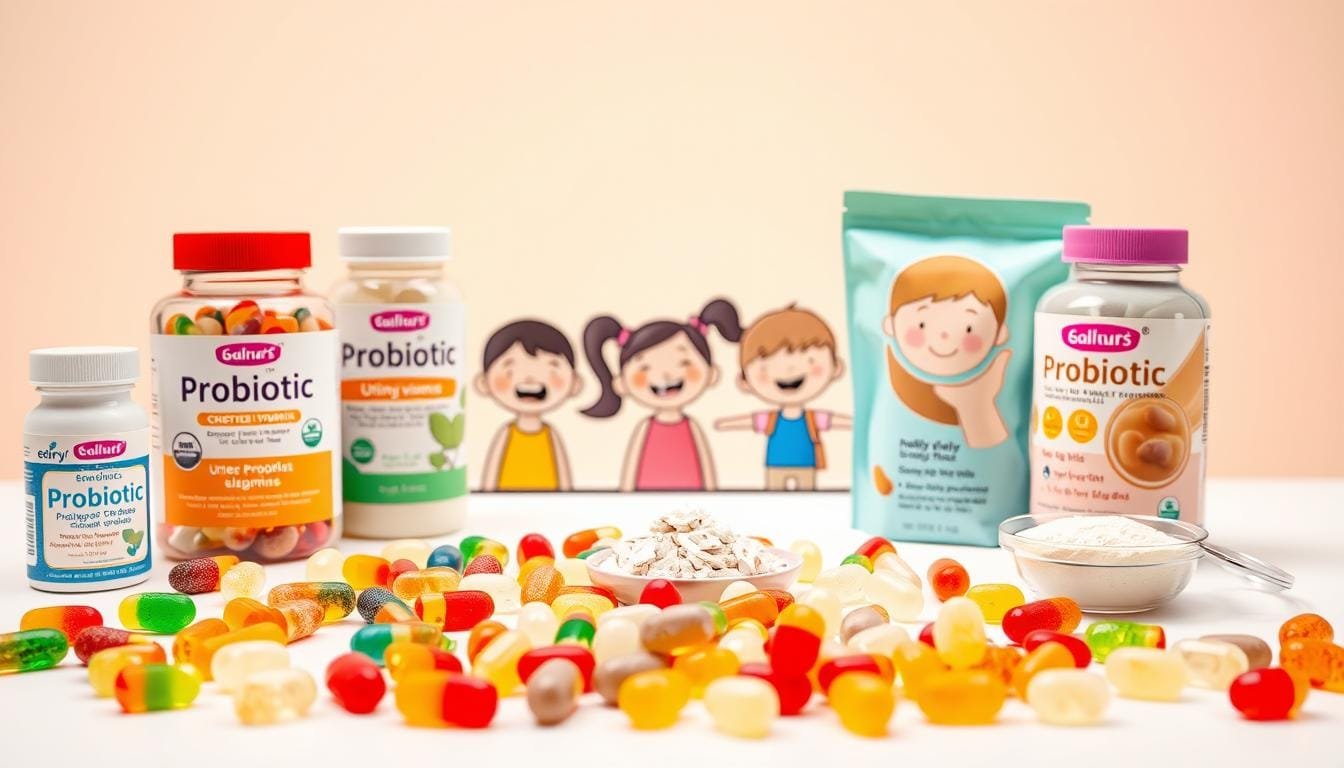Currently Empty: RM0.00
Did you know that 70% of a child’s immune system is located in their gut? This surprising fact highlights the importance of maintaining a healthy gut microbiome, especially in young ones. Probiotics, often referred to as good bacteria, play a key role in supporting digestion, immune health, and overall well-being.
For parents considering probiotic supplements for their child, it’s essential to understand their benefits and potential effects. These live bacteria help balance the gut microbiome, which can improve digestion and reduce symptoms like constipation or diarrhea. However, not all products are created equal, and consulting a pediatrician is highly recommended.
At Wellness Concept, expert advice is just a message away. Reach out via WhatsApp at +60123822655 for guidance on healthy supplements. The team is available Monday-Friday from 9:30 am to 6:30 pm and Saturday-Sunday from 10 am to 5 pm.
This article explores the various forms of probiotic supplements and natural probiotic-rich foods suitable for children. It also emphasizes the importance of professional consultation to ensure the right dose and product for your child’s needs.
Key Takeaways
- Probiotics are beneficial bacteria that support gut health and digestion.
- Consulting a pediatrician is crucial before starting any supplement regimen.
- Wellness Concept offers expert advice on healthy supplements for children.
- Probiotic-rich foods like yogurt can also support gut health.
- Balance and proper dosing are key to achieving the best results.
Understanding Probiotics and Their Role in Child Health
The gut microbiome plays a vital role in a child’s overall health. It’s home to trillions of bacteria, both beneficial and harmful. Probiotics, often called good bacteria, help maintain this balance. They support digestion, boost the immune system, and promote overall well-being.

What Are Probiotics and How Do They Work?
Probiotics are live microorganisms that provide health benefits when consumed. They work by increasing the population of beneficial bacteria in the gut. This helps prevent harmful bacteria from causing issues like digestive discomfort or infections.
Children naturally acquire these bacteria from breast milk and solid foods. For older kids, probiotic supplements can help maintain a balanced microbiome. These supplements come in various forms, including powders, gummies, and capsules.
The Importance of a Balanced Gut Microbiome for Children
A balanced gut microbiome is crucial for a child’s health. It supports digestion, reduces inflammation, and strengthens the immune system. Yogurt, a familiar probiotic-rich food, is an excellent example of a natural source.
Scientific studies continue to explore how probiotic supplements support child health. Balanced microbial strains contribute to robust immune function and overall well-being. However, it’s essential to consult a pediatrician to determine the best approach for your child.
Are probiotics safe for kids: Evaluating Benefits and Risks
Parents often wonder how to support their child’s digestive health effectively. Probiotics, known as good bacteria, offer potential benefits but also come with considerations. Understanding both the advantages and possible side effects is crucial for making informed decisions.

Potential Health Benefits and Immune Support
Probiotics can play a significant role in enhancing a child’s health. They support the immune system by maintaining a balanced gut microbiome. Studies show that specific strains can reduce symptoms like diarrhea and colic, especially when caused by antibiotics.
For example, Lacticaseibacillus rhamnosus GG and Saccharomyces boulardii have been shown to lessen the duration of diarrhea. These strains are often recommended for children experiencing digestive discomfort. Additionally, probiotics may help improve overall digestion and reduce inflammation.
Possible Side Effects and Safety Considerations
While probiotics are generally safe, some children may experience mild side effects. These can include temporary bloating, constipation, or gas. These symptoms are usually short-lived and resolve on their own.
It’s important to note that probiotics may not be suitable for all children. Those with weakened immune systems or underlying health conditions should avoid them unless advised by a pediatrician. Always consult a healthcare professional before starting any supplement regimen.
For more tips on incorporating probiotics into your child’s diet, visit our blog.
- Probiotics support immune function and improve digestion.
- Some children may experience mild side effects like bloating or constipation.
- Consulting a pediatrician ensures the right dosage and safety.
Natural Probiotic Sources and Supplement Options for Kids
Introducing probiotics into a child’s diet can be both fun and beneficial. From natural foods to modern supplements, there are plenty of ways to support their gut health. These options not only provide good bacteria but also make it easier for parents to ensure their child gets the right dose.
Probiotic-Rich Foods: Yogurt, Kefir, and Fermented Vegetables
Natural sources like yogurt, kefir, and fermented vegetables are excellent ways to introduce probiotics. Yogurt, a favorite among kids, contains live cultures that aid digestion. Kefir, a fermented milk drink, offers a tangy flavor and a variety of beneficial strains.
Fermented foods like sauerkraut and kimchi are also rich in probiotics. These foods not only supply good bacteria but also provide essential nutrients. Including these in meals can help maintain a balanced gut microbiome.
Diverse Supplement Forms: Gummies, Powders, and Chewables
For those who prefer supplements, there are kid-friendly options like gummies, powders, and chewables. Gummies are often flavored with fruit, making them a tasty choice. Powders can be mixed into drinks or sprinkled on food for added convenience.
Chewable tablets are another popular option, especially for older kids. These products are designed to be easy to consume and may help support digestion. Parents can choose the form that best suits their child’s taste and needs.
For more tips on incorporating probiotics and prebiotics into your child’s diet, visit our blog.
How to Choose the Best Probiotic Supplement for Your Child
Choosing the right probiotic supplement for your child can feel overwhelming. With so many options available, it’s important to focus on key factors to ensure safety and effectiveness. From reading labels to consulting a pediatrician, here’s a step-by-step guide to help you make the best decision.
Key Factors to Consider When Selecting a Probiotic
When selecting a probiotic supplement, start by checking the strain diversity. Different strains offer unique benefits, so look for products with multiple strains like Lactobacillus and Bifidobacterium. These are commonly found in a child’s gut and support digestion and immunity.
Next, pay attention to the CFU count (colony-forming units). A higher CFU count doesn’t always mean better. For children, a range of 1 to 10 billion CFUs per day is generally recommended. Always check the label for this information.
Product quality is another critical factor. Look for supplements that have undergone third-party testing. This ensures the product is free from contaminants and contains the stated amount of live bacteria. Verified products are a safer choice for your child.
The Role of Pediatric Consultation and Proper Dosage
Before starting any probiotic regimen, consult a pediatrician. They can recommend the right dosage based on your child’s age, health needs, and any existing conditions. This step is especially important for children with weakened immune systems or chronic illnesses.
Scientific studies show that specific strains like Lactobacillus rhamnosus GG and Bifidobacterium breve are particularly beneficial for children. These strains have been clinically researched and are known to support gut health and immunity.
When introducing a probiotic supplement, start with a lower dose and gradually increase it. This allows your child’s body to adjust and reduces the risk of mild side effects like bloating or gas. Always follow the dosage instructions on the product label.
- Check for strain diversity and CFU count on the label.
- Choose verified products with third-party testing for quality assurance.
- Consult a pediatrician to determine the right dosage for your child.
- Start with a lower dose and monitor your child’s response.
By prioritizing quality and safety, you can confidently choose a probiotic supplement that supports your child’s health and well-being.
Conclusion
Supporting a child’s gut health is essential for their overall well-being. Probiotics, whether from natural sources like yogurt or supplements, play a key role in maintaining a balanced microbiome. These beneficial bacteria can improve digestion, boost immunity, and reduce symptoms like diarrhea or constipation.
However, not all products are suitable for every child. Selecting the right strain and dosage is crucial. Consulting a pediatrician ensures safety and effectiveness, especially for infants or children with specific health needs.
At Wellness Concept, expert advice is just a message away. Reach out via WhatsApp at +60123822655 for personalized guidance. The team is available Monday-Friday from 9:30 am to 6:30 pm and Saturday-Sunday from 10 am to 5 pm.
By combining natural probiotic-rich foods with scientifically formulated supplements, parents can make informed choices for their child’s health. Trusting professional advice ensures the best outcomes for growing bodies.
FAQ
What are probiotics and how do they work?
Probiotics are live bacteria that support gut health. They help maintain a balanced microbiome, aiding digestion and boosting the immune system.
Why is a balanced gut microbiome important for children?
A healthy gut microbiome supports digestion, nutrient absorption, and immune function. It can also reduce issues like bloating, constipation, and diarrhea.
What are the potential health benefits for kids?
Probiotics may improve digestion, reduce antibiotic-related diarrhea, and strengthen the immune system. They can also help manage colic in infants.
Are there any side effects to consider?
Some children may experience mild side effects like gas or bloating. Always consult a pediatrician before starting any supplement.
What are natural sources of probiotics for kids?
Yogurt, kefir, sauerkraut, and kimchi are excellent probiotic-rich foods. These can be easily incorporated into a child’s diet.
What types of probiotic supplements are available?
Supplements come in various forms, including gummies, powders, and chewables. Choose one that suits your child’s preferences and needs.
How do I choose the best probiotic for my child?
Look for products with specific strains, proper CFU counts, and third-party testing. Always consult a pediatrician for personalized advice.
Why is pediatric consultation important before starting probiotics?
A pediatrician can recommend the right strain, dosage, and product based on your child’s health needs and medical history.



